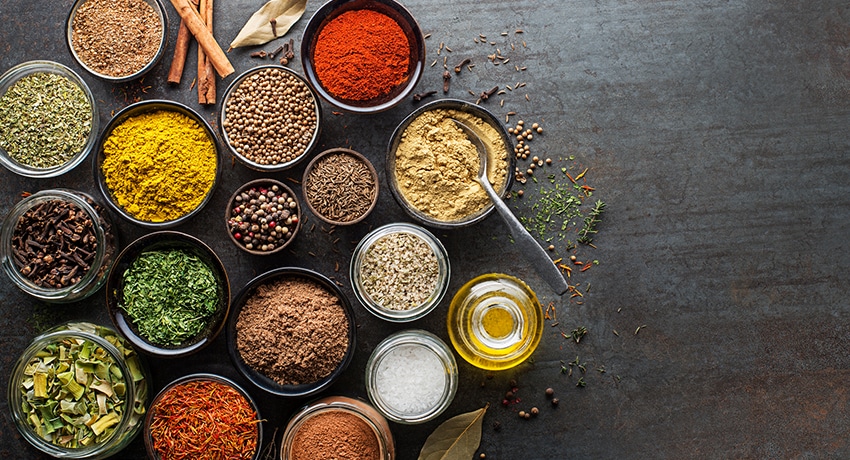The smells, the colors, the sweet, salty, and savory flavors – spices can appeal to many of our senses. They add flavor to our food and aroma to the kitchen, but these powdered roots, dried leaves, and ground seeds are also good for the gut.

“Spices are often overlooked for their nutritional properties, and it’s one of the most important things they offer,” said Gabriela Gardner, registered dietitian manager with UT Physicians Multispecialty – Bellaire Station.
They provide antioxidants, antimicrobial properties, and a little bit of flare to our diet.
“Spices can be so much fun because you’re adding color and flavor to food,” said Gardner.
Scouring her spice knowledge, she shares her favorite healthy spices with superpowers.
Turmeric
Known for its bright, yellow-orange hue, turmeric tops the list of healthiest spices.
That bold color comes from curcumin, a compound that provides potent antioxidants.
Filled with nutrients, turmeric helps to reduce inflammation and protect against cancer and immune diseases.
“There is some research showing the antioxidant activity of turmeric can help protect against those diseases,” said Gardner.
Turmeric is most prevalent in Indian cuisine, like curries and sauces. At home, you can add turmeric to rice, chicken marinade, or even through a beverage called golden milk (recipe below).
Superpower: Turmeric can decrease inflammation and protect against cancer and autoimmune diseases.
Best use: Combine turmeric with black pepper for increased absorption.
To get the most of out this powerful spice, Gardner recommends using the natural powdered form versus taking a supplement.
Ginger
Boasting a robust flavor this flower root may be dull in color, but it is packed with antioxidants.
Ginger is also famous for soothing nausea.
“When I see pregnant moms, who are experiencing nausea and vomiting, I always suggest ginger tea,” said Gardner. “It’s pretty effective.”
Commonly found in teas, ginger can also be added at home to soups, stir-fries, and marinades.
“I personally put it in all my soups, even chicken noodle soup,” said Gardner.
Fresh ginger root is also widely available in most grocery stores. Gardner recommends using fresh ginger root at home and storing it in an airtight container in a cold place.
Superpower: Ginger reduces inflammation and eases nausea.
Best use: Add ginger to cooked vegetables to boost the antioxidant properties.
Cocoa powder
High in flavonoids, a specific type of antioxidant, cocoa powder packs a powerful punch of protection for the cardiovascular system.
“Cocoa powder has been shown to have a protective effect for cardiovascular disease and also improved cognition,” said Gardner. “There is a lot of research with Alzheimer’s, and the studies are still inconclusive, but all these antioxidants in cocoa powder seem to play a role in improving the cognitive condition.”
Superpower: Cocoa powder protects against cardiovascular disease and cognitive decline.
Best use: Add cocoa powder to many baked goods like pancakes, banana bread, cookies, and muffins. You can enjoy it in a hot beverage form like hot chocolate or added to coffee.
Choose cocoa powder that is at least 70% cocoa because darker chocolate is more nutrient-dense. Also, make sure there is no added sugar.
Oregano
A popular herb, dried oregano is a staple in Gardner’s kitchen. The small green leaves, she says, offer great microbial properties to help ward off bacteria.
“It will not substitute an antibiotic if you have an active infection, but we know that it will help maintain a good balance in the gut,” said Gardner.
The versatile herb can be used in a wide range of dishes from pasta and vegetables to chicken and fish.
Superpower: Oregano promotes healthy digestion and a balanced gut.
Best use: Combine oregano with other Mediterranean herbs, like rosemary, to enhance the antimicrobial effect.
Cinnamon
The sweet-smelling scent of fall, cinnamon, should be included in your diet year-round.
“It’s been shown to improve glucose control in people with diabetes,” said Gardner. “Clinical studies have shown improved glucose levels when it is used daily.”
Filled with both antimicrobial properties and antioxidants, this healthy spice can easily be added to oatmeal, baked goods, and fruits like apples, pears, and peaches.
Superpower: Cinnamon improves glucose control and decreases the absorption of cholesterol and fatty acids.
Best Use: Add a cinnamon stick to black tea, which already has antioxidants, to increase the health benefits.
Salt and sugar replacement
One of the biggest and most overlooked health benefits spices offer is as a substitute for salt and sugar.
“Often people will add salt or sugar to their foods for flavor and they forget that they can use herbs or spices to add flavor instead,” said Gardner.
Spice storage
To prevent dried spices from losing nutrition, storage is important. Avoid direct heat and sunlight.
“One common mistake I see is to keep them next to the stove,” said Gardner. “You definitely don’t want to have your spices there because the heat will degrade the antioxidant components.”
She says prolonged exposure to oxygen will also deplete their health benefits.
For best storage spices should be kept in glass containers, tightly sealed, and stored in the dark like a pantry.
Also, the older the spice the lower the antioxidant content, so it is important to follow use-by dates and consume spices regularly to avoid keeping them in your pantry for years.
Variety is the spice of life
When it comes to nutrition, it is important to consume a combination and variety of foods. The same holds true for spices.
“I have my favorite spices, but of course the more variety you have, the more benefits you will get from these spices,” said Gardner. “If you use multiple spices, they actually have a more potent effect when used in combination than when used separately.”
Recipes
Anti-inflammatory seasoning mix
2 tablespoons ground turmeric
2 tablespoons ground cinnamon
2 tablespoons ground ginger
2 tablespoons ground nutmeg
1 tablespoon ground cloves
Directions: Combine all ingredients and store the mixture in a glass jar.
Golden milk
1 teaspoon of the anti-inflammatory seasoning mix
8 ounces of hot or cold milk
Directions: Add anti-inflammatory seasoning mix to hot or cold milk, stir, and enjoy.
Tip: The anti-inflammatory mix will dissolve best in hot milk. You can also use a frother to help mix directly in the cup.
Antibacterial seasoning mix
2 tablespoons dried oregano
1 tablespoon dried basil
1 tablespoon dried thyme
1 tablespoon dried rosemary
1 tablespoon dried marjoram
1 tablespoon dried parsley
Directions: Combine all ingredients and store the mixture in a glass jar. Add this Mediterranean seasoning to poultry, fish, vegetables, soups, or pasta.
Enjoy!


